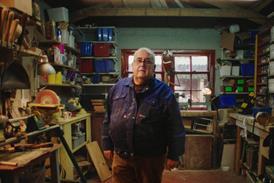
Pedro Almodóvar reflected on his long career and the political nature of his films at the San Sebastian International Film Festival (SIFF) where he is in town to receive the festival’s honorary Donostia Award.
Almodóvar attended a packed press conference today (September 26) with cast including Tilda Swinton from his first English-language feature: The Room Next Door, which earlier this month won the Golden Lion at Venice.
Almodóvar arrived in San Sebastian yesterday (September 25), the day of his 75th birthday.
“The last 24 hours have been an emotional whirlwind, even more so than I expected,” said the director. “I have been on the verge of tears, holding them back sometimes and sometimes not very successfully.”
He recalled coming to the Spanish festival right at the start of his career, 44 years ago, with Pepi, Luci, Bon. “I remember talking about the film, saying: ‘If a movie has one or two flaws people highlight them, but mine has so many that it becomes a style.’ That’s how cheeky I was.”
“Yesterday, arriving at the hotel, I realised how things have changed in the world in these 44 years, and in my life,” he said.
The Room Next Door centres on a war photographer, played by Swinton, who is dying of cancer and asks her friend (Julianne Moore) to help her face the end. Almodóvar talked about the need for sensitivity on topics such as euthanasia or immigration. “That’s what The Room Next Door is about, empathy.”
The Room Next Door also stars John Turturro as a climate-change doomsayer. Almodovar quoted from one of his lines in the film: “’I have lost faith in human beings,’” adding, “The worst that can happen to a society is that the far right and ultra-liberalism align, as we see nowadays. We can only fear they will take the worst decisions for all of us. What happens in the US [referring to the elections] will not only concern Americans, it will affect all of us. I would like to vote there too.”
“With the exception of Parallel Mothers where it was more visible, my films have always been political without being overtly so. Right from the start, from Pepi, Luci, Bon and Labyrinth Of Passion, where I did not even acknowledge the shadow of the memory of Franco. It was my personal revenge to the dictatorship. These two hedonistic, pop films had an implicit message: freedom. That is in all my films. As an auteur, I have put my characters in difficult and extreme situations, otherwise it would be a bore, but I have always given them absolute moral autonomy, whatever their social status. I want my characters to be as free as I was when I wrote them.”
Almodovar says he intends to carry on saying what he truly thinks: “I like being spontaneous, something that in a world of political correctness is in danger.”
Reflecting on his career, the Spanish auteur said: “I never thought about whether I had talent or not, the only thing I could think about was that I had a vocation stronger than myself and that if I didn’t manage to make films I would be the unhappiest person in the world. I was not at the right place, I had no money, no friends in the industry. So the best thing I can say about these 44 years is that I have managed to have a career and make 23 features. Some are better than others, but they are all mine. This is a privilege that is not possible to all filmmakers.”
On a practical level, he highlighted how important it had been that his producing brother Agustin had “the brilliant idea of creating El Deseo”, their Madrid-based producing outlet named after Law Of Desire. “We can be autonomous and own our work.”

























No comments yet